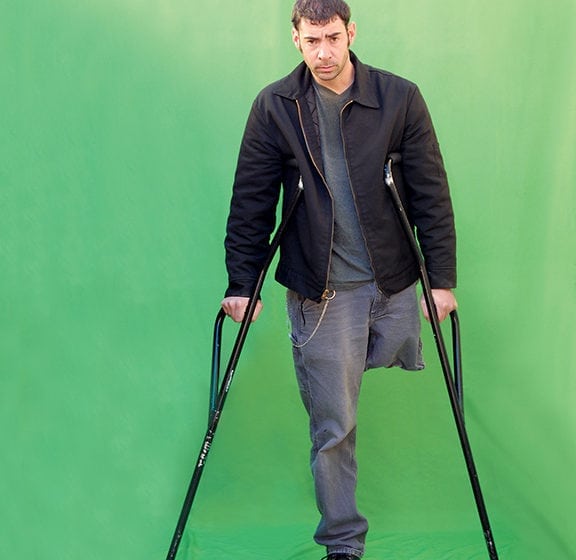McGee landed his gig on Season 1 of Big Brother, he says, “almost on a dare.” He was attending the University of Texas at Arlington (majoring in broadcasting via a scholarship for his wheelchair basketball prowess), when a friend suggested he apply for a role on a new TV show. He took the challenge, gathering an eclectic group of friends that evening to help fill out the show’s lengthy questionnaire.
However, when he turned in his application, he learned that he needed a video audition, too.
As McGee recalls, “I said, ‘Hey, I’m a college kid, I don’t have a video camera; this is all I got.’ But the girl at the TV station was cool. She said, ‘We got one in the back; why don’t you come with me?’”
While she prepped the camera, McGee quickly came up with a unique pitch: Instead of trying to present an autobiography or being cute, coy, or friendly, he opted for brief, gruff, and vulgar.

His entire video audition consisted of, “Hey, how you doing? I’m Eddie from New York. I play basketball here in Texas. I lost my leg to cancer as a kid. Now, you want to know anything else about me, you come find me. Turn that [deleted] camera off!”
It worked. He was cast on the show, going on to become its first winner and the recipient of $500,000 for lasting 88 days in the Big Brother House.
After that, McGee pursued an acting career, with lead roles in films such as Drop Dead Roses and guest spots on several TV series, including Shooter, Elementary, NCIS: Los Angeles, Desperate Housewives, and Law & Order. To date, he has tallied more than two dozen acting credits. His short film, The Angel, won awards at the Long Island International Film Festival, and the horror feature, The Human Race, in which he also starred, garnered several prizes, including honors at the Mile High Horror Film Festival.
A natural athlete, McGee relished the opportunity those award-winning films offered to use his physicality. He fondly remembers other acting roles for different reasons.
“The first film I did was called Drop Dead Roses, and it was amazing,” he says. “I was cast as a co-lead in this fun little rom-com. That was just exciting.”
Although he yearned to be an actor from a young age, this experience confirmed his acting bug.
“I knew this was for me,” he explains. “I didn’t care how much I had to struggle and strive; I was going to do this.”
McGee adds that his role on NBC’s Law & Order, where he worked with veteran thespian Sam Waterston, was “the highlight of my New York career.” Yet, another role has him hoping for broader possibilities—a character he recently played on CBS’ Americanized Sherlock Holmes drama, Elementary.
“That’s probably my most proud accomplishment in my acting career, because the character is disabled, but that’s part of who he is, it doesn’t define him,” he says.
The character, Theodore, is the ex-military owner of a helicopter company in New York City and is in Narcotics Anonymous with Holmes, so “he’s Sherlock’s go-to guy for military intel.”
“[Theodore has] all these great traits that make him an interesting, fun, and complex character,” McGee says, add-ing that there is potential for the character to recur on the series, if it is renewed for a sixth season.
McGee is also enthusiastic about a project he is pursuing for his Tripod Productions. In collaboration with his writing and producing partner, Paul Hough, McGee is seeking funds to develop a film Hough scripted called Noon Tomorrow. They hope to begin filming this summer. Hough also wrote and directed The Angel and The Human Race.
In addition to acting and producing for the big and small screens, McGee and Hough develop videos focusing on horror in everyday situations for the YouTube channel Don’t Turn Around.
In a way, McGee’s career has taken him full circle. He knew he wanted to be an actor when he was 6 or 7. However, when he lost his left leg at age 11, he thought that dream was lost, because he saw no role models with disabilities in mainstream media. That is why he went into broadcasting in college, hoping to return to Long Island and land a radio gig. Now, having moved to the West Coast to increase his acting opportunities, his goal is to play a character who will serve as an example for kids growing up with disabilities.
As proof that such a role model is needed, he cites a 2011 Screen Actors Guild study that revealed that less than 1 percent of series characters on the five major networks have disabilities. In contrast, 12 percent of the U.S. population has some form of disability.
“I want to play someone you can identify with,” McGee says. “If you are a young black kid, you can look up to someone like Denzel Washington or Halle Berry, and the same with other minorities. But if you are disabled, there is no one you can say, ‘Hey, I can be like that character or that actor.’ So I struggle and strive every day and hope to one day be that guy who can inspire.”



